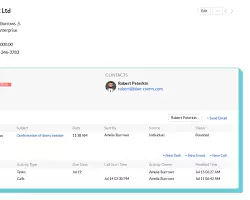Elevate Account Management with CRM: Nurturing Client Relationships and Driving Growth in 2024

Account Management in CRM Software
In the dynamic landscape of modern business, effective account management is the cornerstone of sustainable growth and enduring client relationships. Customer Relationship Management (CRM) systems are revolutionizing how businesses nurture their key accounts, providing a holistic view of customer interactions, streamlining processes, and driving revenue.
The Crucial Role of Account Management
Account management encompasses the strategic and tactical activities involved in managing client relationships, with the goal of maximizing customer satisfaction, retention, and revenue generation. It goes beyond mere sales transactions, focusing on building long-term partnerships and fostering mutual success. Key components of account management include:
- Relationship Building: Cultivating strong, trust-based relationships with clients through personalized communication, understanding their needs, and providing proactive support.
- Opportunity Identification: Identifying and pursuing opportunities to upsell or cross-sell products and services to existing clients, increasing their lifetime value.
- Issue Resolution: Promptly addressing client concerns and resolving issues to ensure satisfaction and prevent churn.
- Performance Tracking: Monitoring key account metrics, such as revenue, profitability, and customer satisfaction, to evaluate performance and identify areas for improvement.
How CRM Transforms Account Management
CRM systems have become indispensable tools for account managers, offering a centralized platform to manage and analyze client data, streamline communication, and automate tasks. Key CRM features for account management include:
- 360-Degree Customer View: Access a comprehensive view of each client, including contact details, purchase history, communication logs, and relevant notes.
- Interaction Tracking: Log and track all client interactions, such as emails, calls, meetings, and support tickets, to gain insights into their needs and preferences.
- Order and Invoice Management: Track customer orders, invoices, and payment history to ensure timely delivery and accurate billing.
- Contract Management: Store and manage client contracts, including renewal dates and terms, to ensure compliance and avoid missed opportunities.
- Account Activity Reporting: Generate customized reports on account performance, including revenue, profitability, customer satisfaction, and engagement levels.
Best Practices for Account Management with CRM
- Personalization: Tailor your communication and interactions to each client’s specific needs and preferences, leveraging CRM data to deliver personalized experiences.
- Proactive Communication: Regularly communicate with clients, providing updates, addressing concerns, and sharing relevant information to stay top-of-mind.
- Value-Driven Solutions: Focus on delivering value to clients by understanding their pain points and providing solutions that address their specific challenges.
- Relationship Building: Invest time in building strong relationships with key stakeholders within each account, fostering trust and collaboration.
- Continuous Improvement: Continuously analyze account data and feedback to identify areas for improvement and optimize your account management strategy.
Conclusion
Effective account management is a strategic imperative for businesses seeking to thrive in 2024 and beyond. CRM systems empower account managers with the tools and insights needed to build lasting client relationships, drive revenue growth, and achieve long-term success. Embrace the power of CRM for account management and elevate your client relationships to new heights.

Fundamentals of CRM with Dynamics 365 and Power Platform

Marketing Automation For Dummies

Successful Direct Marketing Methods: Interactive, Database, and Customer-based Marketing for Digital Age (BUSINESS BOOKS)

CRM & FFHH: analysis of real accidents

Connected CRM: Implementing a Data–Driven, Customer–Centric Business Strategy

Special Edition Using Microsoft CRM
Related Guides: See all
- AI-Powered CRM: Supercharging Customer Relationships with Intelligent Automation and Predictive Insights in 2024
- Omnichannel Engagement with CRM: Crafting Seamless Customer Journeys in 2024
- Personalization Powerhouse: How CRM Drives Customer-Centric Experiences in 2024
- Customer Segmentation Mastery with CRM: Unlock Personalized Marketing and Sales Strategies in 2024
- Mastering the Customer Journey with CRM: Elevate Experiences and Boost Loyalty in 2024
- Social CRM: Building Stronger Customer Relationships Through Social Media in 2024
- Cloud CRM: Revolutionizing Business Agility and Scalability in 2024
- Mobile CRM: Empowering Sales and Service Teams on the Go in 2024
- CRM Integration and API: Unifying Your Business Ecosystem for Seamless Operations in 2024
- Data-Driven Decisions with CRM: Harness the Power of Reporting and Dashboards in 2024